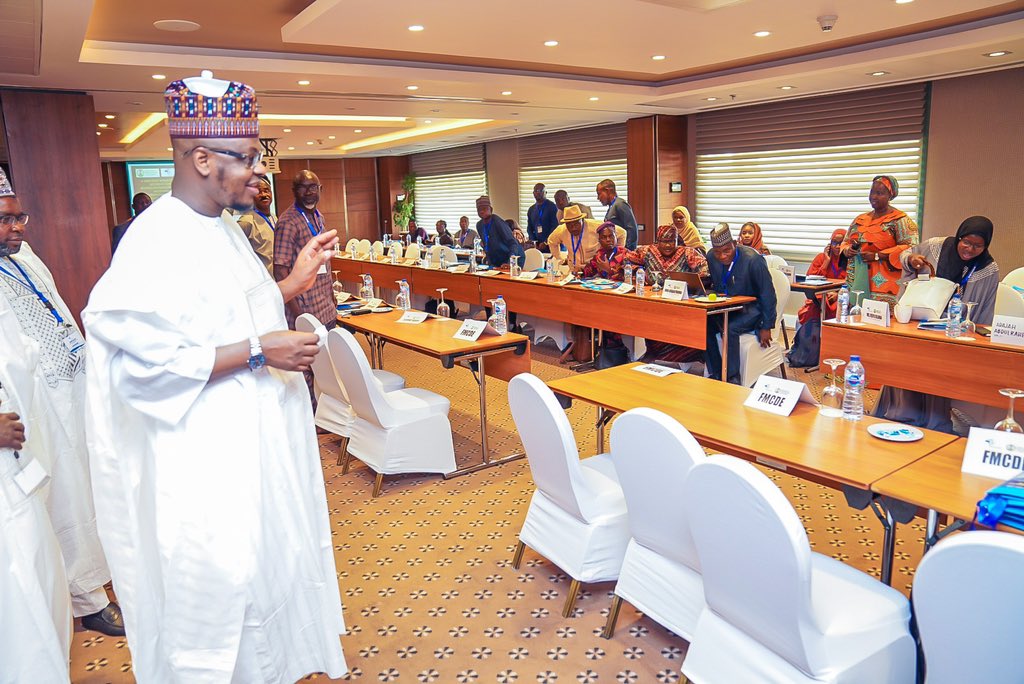
Says some civil servants leveraging on procurement Act to perpetrate corruption
Charges NIGCOMSAT to reposition or risk being scrapped
Minister of Communications and Digital Economy, Isa Ali Pantami has raised the alarm that some civil servants are leveraging on the procurement Act to perpetrate corruption.
He stated that there are so many important laws in Nigeria but in the course of implementation, instead of making use of them positively, they have sometimes become a challenge.
Speaking at the Ministerial Retreat for the Board and management of the Nigerian Communication Satellite Ltd with the theme, “Re-engineering the NIGCOMSAT Board and management for 4th Industrial Revolution and exponential growth”, Pantami lamented that any policy introduced is mostly abused adding that the procurement Act is an important legislation to fight corruption but today people are leveraging on it to perpetrate corruption
The minister who stressed the need to revive and reposition NIGCOMSAT for better performance, efficiency and effectiveness, recalled that the 2012 Orunsanye report recommended the merging and scrapping of 106 Federal government institutions.
He said, “I have carefully studied the report and observed that the recommendation of institutions to be retained and those to be scrapped depends largely on performance. If we can turn things around and make our Institution very productive and effective, there is no way the government can think of scrapping or merging our institution. NITDA was recommended to be scrapped but today, the way NITDA has performed, the government is not talking about scrapping NITDA again or merging NITDA rather, the government is talking about adding more responsibilities to the agency. If we fail to turn things around, from time to time, that issue will re-emerge on whether NIGCOMSAT should be privatized or commercialized. If NIGCOMSAT fails to utilize this opportunity, I don’t think there would be any time it can do so”.
Pantami noted that Civil servants are the engine of government but unfortunately in Nigeria, the reverse is the case as sometimes, civil servants fail to perform but rather use their unions to intimidate the government.
The who explained why the new Chief Executive Officer of NIGCOMSAT, Engr. Tukur Mohammed Lawal was picked from the private sector, saying, “If you want to change things positively in a government company, you have to bring someone from the industry because if you bring someone from the government, it will be business as usual. With all the resources the country is endowed with, the private sector controls our economy, government institutions usually find it difficult to turn things around and to think out of the box. Today if you look at the National aggregate demand, with all the resources, the private sector controls more than 92 percent, and the entire Federation revenue is less than 8 percent of our national aggregate demand because people in government find it difficult to turn things around”.
his remarks, CEO of NIGCOMSAT, Engr. Tukur Mohammed Lawal said that the need for NigComSat 2 is imperative more than ever before adding that with less than four years to deorbit the present satellite (NigComSat 1R), the need to fast track and quickly ensure additional satellites to the country’s space industry cannot be overemphasized.
He observed that the organization has its teething problems but the problems are not insurmountable.
Tukur noted that as a private sector manager of human and material resources, his desire is to nudge NIGCOMSAT Ltd onto the path of profitability and Solicited the support of the Minister, staff and management to restore confidence in the Nigerian public in our effort towards reenergizing the company.
Also speaking, Chairman of the Board of NIGCOMSAT, Arch Yusuf Kazaure said that Nigeria is coming to grips with the realities of the emergence of a new world order characterized by a combination of artificial intelligence (AI), robotics, the Internet of Things (IoT), 3D printing, genetic engineering, quantum computing, and other advanced technologies.
He noted that this is the 4th industrial revolution built on the foundations of the first three revolutions namely the steam engine, the age of science and mass production and the rise of digital technology.
Kazaure observed that while most of the developing world like Africa is still grappling with the 3rd revolution, the rest of the world has moved on to the 4th revolution which has brought the need for new skills in both management and leadership.



